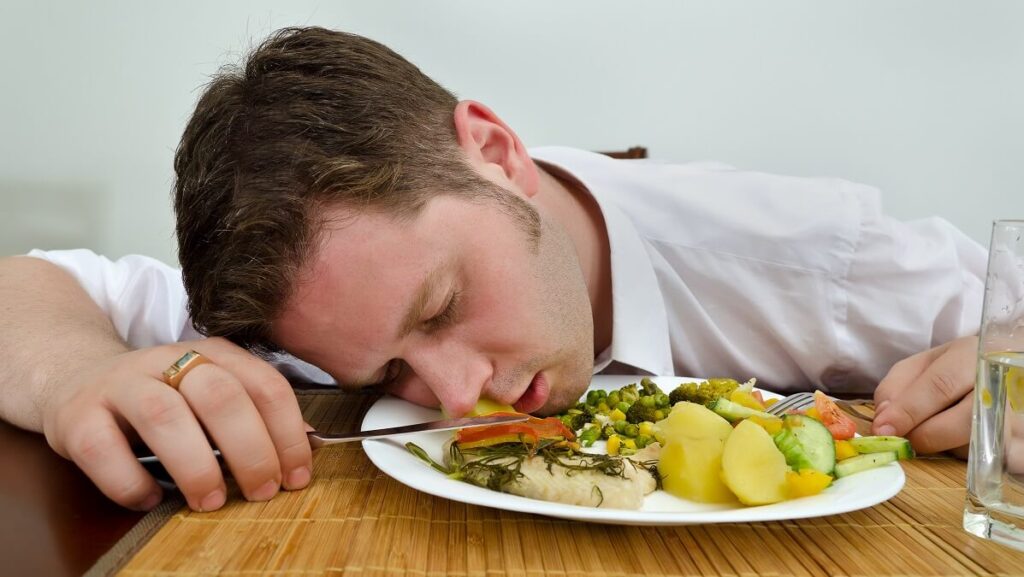It’s normal for energy levels to spike and dip throughout the day. It’s down to multiple factors such as how well you slept, your stress levels, how much you’ve been moving, and your food choices.
Generally, having a meal or snack tends to refuel your tank and provides energy. However, some foods may do the exact opposite.
Whether you wake up feeling tired or hit that 2pm slump without fail, it could pay to take a look at your diet. Here are seven common foods that might be sapping your energy.
Processed grains
Grains tend to be rich in carbohydrates, which usually provide the body with a good source of energy. However, processed grains such as those found in white bread, muesli bars, cakes, muffins, white rice and pasta may do more harm than good.
You’ll typically receive a quick burst of energy from consuming processed grains, but feel sluggish soon after. The grains are stripped of their fibre during processing, allowing your body to easily digest and absorb them. Meaning the sugar in these foods reach your bloodstream quickly, causing a spike and a drop.
In contrast, wholegrains help you regulate your blood sugar levels and keep your energy constant throughout the day.
Avoiding processed grains or replacing them with wholegrain alternatives can provide your body with more nutrients and prevent energy peaks and crashes.
Foods with added sugars
Everything from instant porridge to soy milk to rice crackers often includes added sugars. It’s certainly hard to avoid.
The only way to tell whether sugars have been added is by checking the ingredients list. Typically, the higher up the list, the more sugar the product contains.
But when added sugars can hide behind more than 60 different names you may still be none the wiser.
It’s not just your energy you have to worry about, sugar may cause weight gain, heart disease, diabetes, high blood pressure and more.
If you can replace these high-sugar foods with ones your body processes more slowly, you won’t get those spikes and you’ll see an improvement in your energy levels.
Wholegrains, fruits and vegetables, and lean proteins are all good options.
Low-calorie meals
It’s easy to reach for low-calorie options of your favourite foods, believing you’re choosing the healthier option. However, if you’re consistently consuming fewer calories than your body needs, it could severely reduce your energy levels, create hormone imbalances and slow your metabolism.
Eating too few calories can also increase cravings, especially for denser, high-calorie foods.
If you want a salad for lunch, bulk it up with chicken, chickpeas, quinoa or edamame for slow-burning energy. But beware of sugary salad dressings; oil and vinegar is typically a better choice.
Alcohol
We’ve all heard how alcohol can affect sleep. A review of 20 studies found that indulging in too much alcohol can interrupt REM sleep, which is vital for concentration.
Although alcohol may help you fall asleep, it may actually be draining your energy by interrupting your sleep, causing you to wake up the next morning feeling less rested.
Low to moderate levels of alcohol consumption do not appear to have much influence on your sleep quality or duration.
Fried and fast foods
Fried and fast foods tend to be high in fat and low in fibre, two things that slow down your digestion.
Excess fatty food can leave you feeling overly full, causing a dip in your energy levels for the next few hours.
They also tend to be low in vitamins, minerals and other essential nutrients. Nutrient-rich foods help boost and maintain your energy levels.
Caffeine
Perhaps a surprising one on this list. Caffeine can temporarily pick your energy levels up by activating your nervous system. But typically, once the initial effect wears off, you’ll be left in worse shape than before.
You can often be left feeling tired and irritable, perhaps with a headache.
Caffeine, from coffee or energy drinks, can stay in your system for five to 15 hours and can affect sleep during this time.
Dairy
A dairy intolerance can develop at any stage of life. If you’re noticing a lack of energy after eating yoghurt or cheese, it could be the culprit.
The intolerance is to the casein proteins in milk and other dairy products. When people with an intolerance consume these foods, the body mounts an immune response by producing antibodies to the protein and releasing histamine into the blood. Causing a range of side-effects such as bloating, pimples, nausea and fatigue.
Many foods contain hidden sources of milk, including processed meats, baked goods and soy products, so it can be a difficult intolerance to identify.
Chart your reaction to different cheeses as some people can handle soft cheese but not hard cheese, and vice versa. Try out one of the many options of low dairy or no dairy varieties of milk on offer.
Do you find some foods seem to sap your energy? What foods do you avoid? Leave your thoughts in the comments section below.
Also read: Three superfoods to add to your diet
Disclaimer: This article contains general information about health issues and is not advice. For health advice, consult your medical practitioner.

